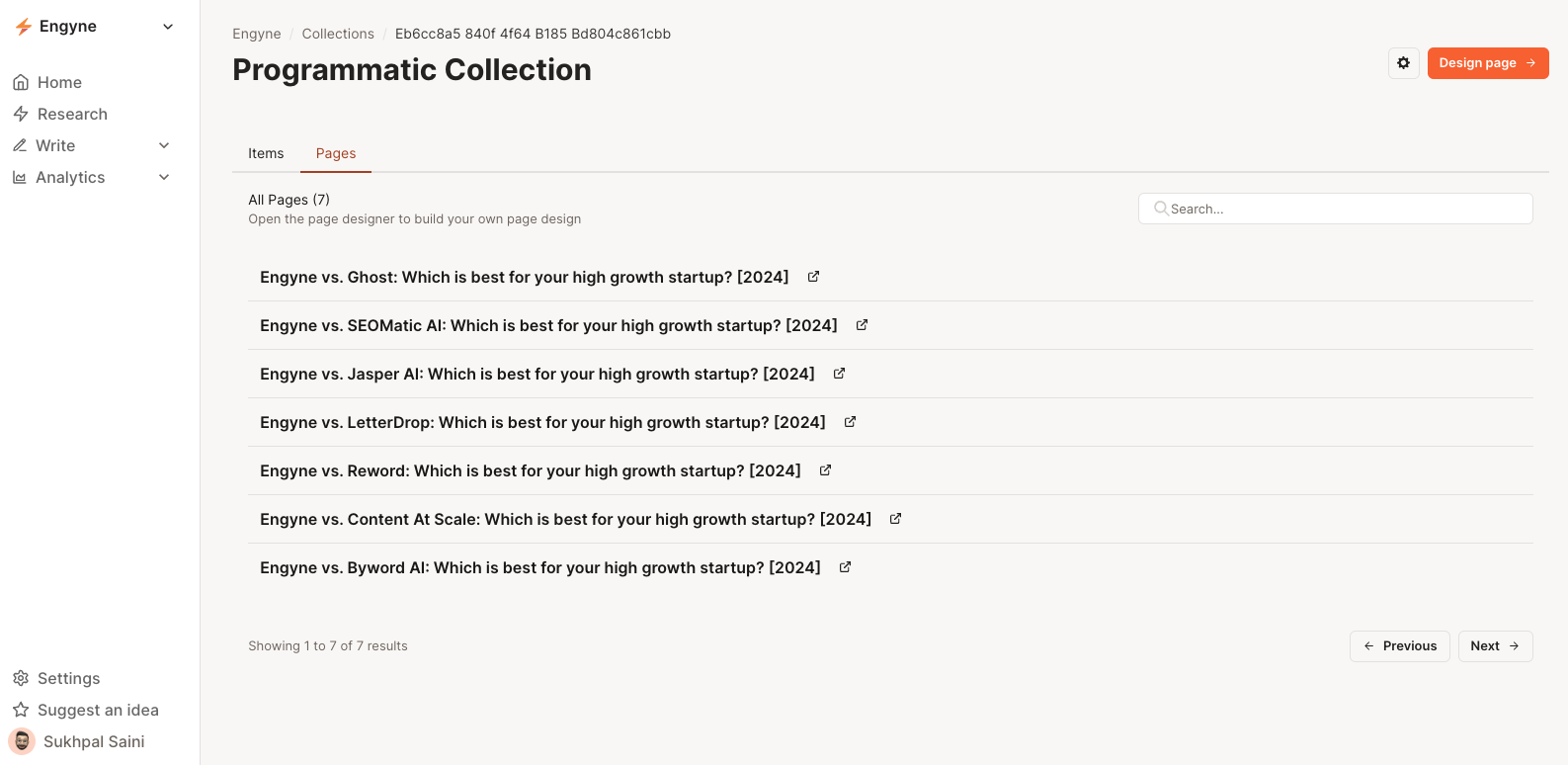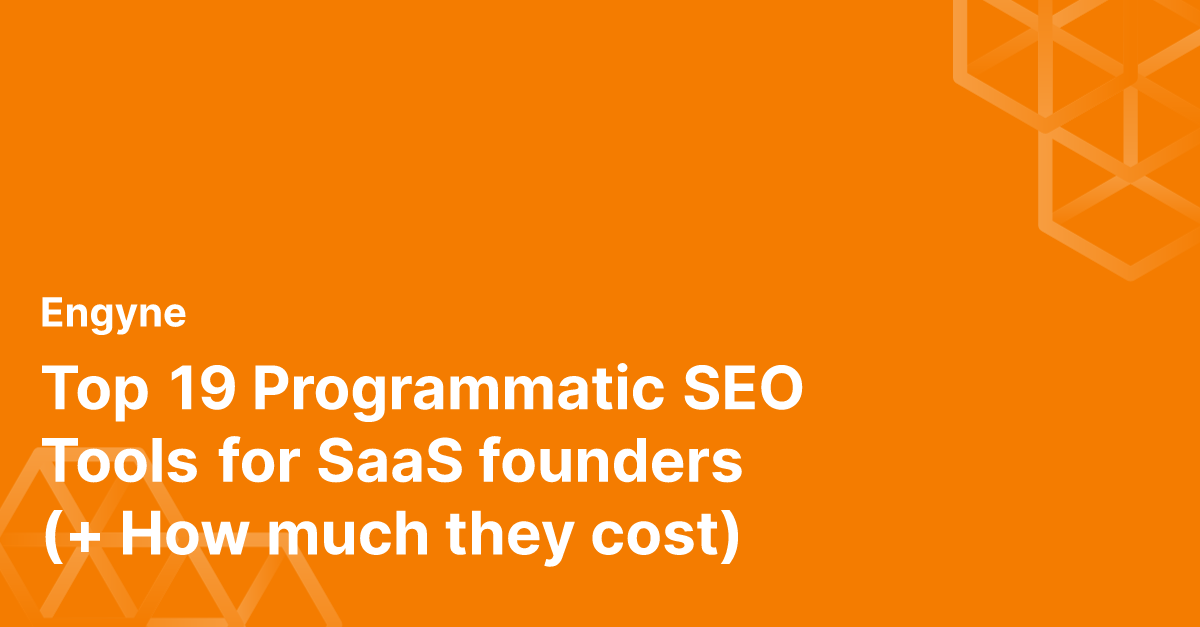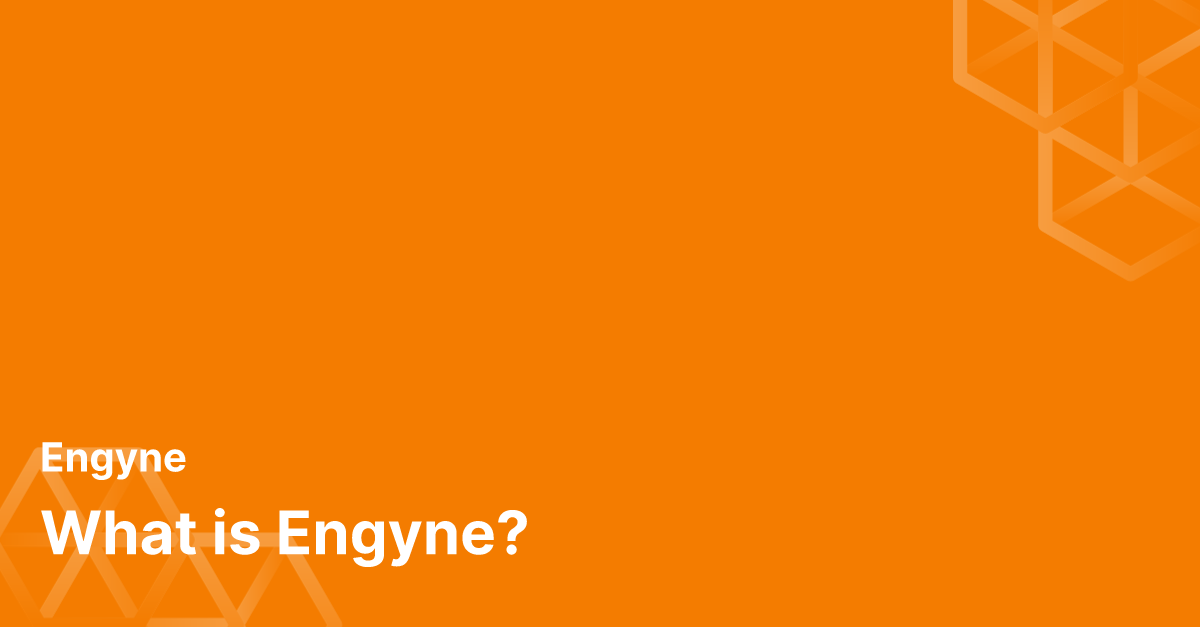There is no question that programmatic SEO can be a significant growth driver when it comes to content marketing, but it's only effective when done right. The key is to speed up how fast content is produced so you can start iterating on the results immediately rather than wait months, as is the case with traditional SEO.
Here are 19 tools that will help you speed up your Programmatic SEO pages so you can start creating content fast:
No-Code Programmatic SEO for B2B SaaS
1. Engyne ($200/mo)
Engyne is an all-in-one platform for Programmatic SEO. It helps you do keyword research, develop the content you need to write, and then also helps you set up a Programmtic SEO collection where you can have a single page template and dynamic variables defined that change based on the page title.
Below we have a collection set up for competitor pages. Instead of writing out each page separately, we compile an Airtable base where each row contains the competitor name, URL, description, pricing and even images. By syncing that data into Engyne, we were able to create several competitors with just 1 page copy.
 Programmatic SEO dashboard in Engyne
Programmatic SEO dashboard in Engyne
We're in private beta at the moment. If this looks interesting, book a call with us here.
Web Scraping
To start with Programmatic SEO, you need data. If you don't have a good set lying around, your next bet is to scrape it from various sources on the Internet. These tools will help you grab text from web pages without having to copy/paste all night by hand.
2. Bardeen AI (Free)
Bardeen is a monster when it comes to scraping data. You can scrape links, texts, and images from a page without code. Click on the data you want to copy, and it will automatically recognize similar elements on the page. This is especially useful when dealing with an infinite list of results with pagination (which is most pages these days).
Keyword Research
Creating pages that actually rank starts with solid keyword research. Knowing which keywords people commonly use and what type of pages Google shows them (search intent) is 85% of the battle.
3. Ahrefs (My personal favourite, paid)
Ahrefs is the market leader for effective keyword research for any SEO marketer. It surfaces tons of insights like search volume and top search results for your keyword idea. The "Matching Terms" and "Related Terms" reports are beneficial for uncovering keywords you might not have even thought about writing for.
4. Keyword Chef ($20 for 1200 keywords)
Ahrefs does much more than keyword research (which is why it can get expensive). If you're looking for a tool that hyper-focuses on helping with keyword research and doesn't break the bank, Keyword Chef is what you need to try. Its wildcard search functionality lets you use * as a placeholder to bring up unique ideas with a good search volume you can plan around.
Programmatic Images
Images spice up a page like no other but creating them one by one is a momentous task. Here are a few ways to bulk-create images for your Programmatic SEO pages.
5. Tailgraph (My personal favourite, free)
Tailgraph is a fantastic service that lets you generate hero images that sit at the very top of your pages. Use their online dashboard to create a copy-pastable URL that specifies how the rendered image will look. Add a title, subtitle, and background, and customize fonts and colours to match your brand.
Combine Tailgraph with Google Sheets' "CONCATENATE" function to generate featured images in bulk.
6. Placid.app ($19/mo for 500 credits)
Where Tailgraph has a specific layout of the image, Placid lets you customize the image layout completely while making sure that you can dynamically insert text, and logos in there. Similar to Tailgraph, You can create an image template with custom elements as placeholders which can be swapped out by sending parameters using the generated URL.
7. Screenshot One (Personal favourite, free for 150 screenshots)
Screenshot One is a lifesaver if you curate online brands. Screenshot One can programmatically screenshot a website (in any screen size) and return you a PNG to use. You can also tell it to wait a few seconds, so it doesn't take a screenshot of a half-rendered website.
Page Builders
8. WP All Import
WordPress is one of the most powerful website builders out there. WP All Import plugin lets you create many posts from a data source, typically a CSV. It works very well for niche sites monetized with Google ads.
Content Writing
Even when creating pages programmatically, having at least 800 words on the page is recommended for Google to take the page seriously. Here are a few tools that will help you write engaging content quickly.
9. Rytr (Free for 10 chars/mo)
AI text generation is beneficial in coming up with good writing. Google has strict policies against ultimately generating AI text for websites, but no one said anything about using it as a guide. Use it to spice up your handwritten content, to rephrase, or expand on points.
10. Google Sheets (free)
Google Sheets is a classic spreadsheet editor that everyone knows and loves. Data for Programmatic SEO pages are typically in a tabular format. Use Google Sheets to clean, prep, and morph it into something that's actually readable by a human.
11. Airtable (free)
Airtable is a great modern alternative to Google Sheets. Its familiar spreadsheet editor interface uses formulas to calculate data, and organize information in tables, and provides more advanced features such as collaboration, automation, and customizable views. It has integrations with basically every SaaS tool out there, which lets you import data easily.
12. ChatGPT
While Rytr helps you explicitly with writing, ChatGPT is a real workhorse that gets you an answer for anything you ask. Looking for the list of top attractions in Egypt? Tools Developers use daily? Ask ChatGPT, and it will come up with a list in no time.
Combine OpenAI's API with Google Sheets, and you have an instant content machine that gets you relevant answers faster than you can say, "Let me try to Google that".
Analytics
Tracking which pages are getting traffic, how many are converting, and what keywords people are using to get there are all critical metrics that every Programmatic website should be keeping track of. Here's the best tool for analytics.
15. Plausible ($5/mo)
Plausible is a privacy-friendly analytics tool that lets you see how many people came to the site and from where. There's even an integration with Google Search Console that reports what keywords were used. When setting up a Programmatic SEO site, it's really a no-brainer to use Plausible for analytics.
Indexing
Publishing pages to the web doesn't mean that you will start getting traffic right away. Google has to come index your pages, so they show up in the search results. These tools can help you understand if Google if your pages are in order from a technical standpoint - titles are a good length, images load fast etc.
17. HeyMeta (free)
HeyMeta is a reliable SEO tags checker for a webpage. It's a good idea to verify tags for titles, descriptions, keywords, and images before putting them live to see how Google will see your pages.
18. SEO checker (Personal favourite, free)
SEO Checker is a great tool that audits your website and creates a comprehensive technical report. It checks everything from missing alt text on images to security vulnerabilities.
19. IndexMeNow (Personal favourite, $49 for 60 credits)
When you publish your pages, it can take a long time for Google to index them. IndexMeNow cuts that time down to 24 hours. I've personally used it many times and can attest to its quality.
Next Steps
In conclusion, programmatic SEO is a crucial aspect of modern digital marketing, and the use of the right tools can help optimize your website and improve search engine rankings.



